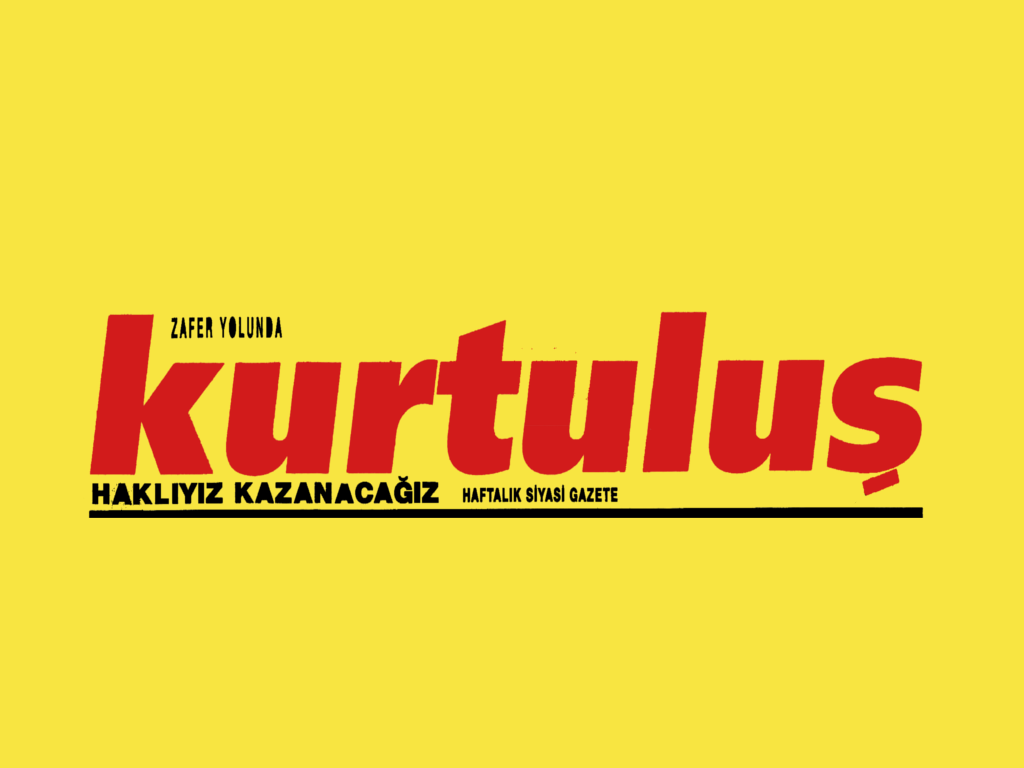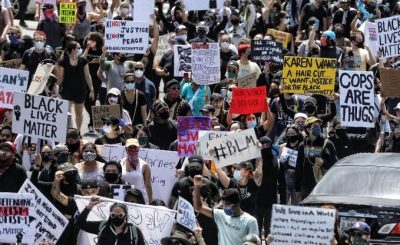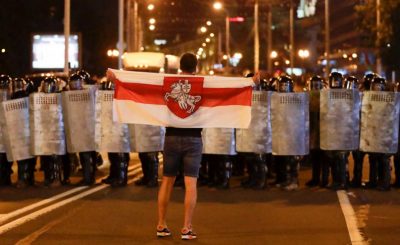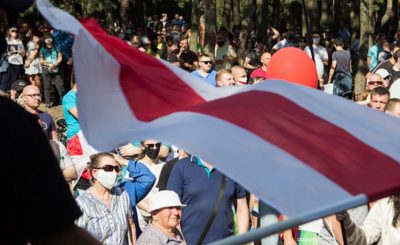Words like “clean society” and “a state of law” are frequently used nowadays. The state of law is demanded in unison… But what is it, a state of law? When it comes, will all problems be solved like with some kind of magic? The interpretation of such notions is important. Notions like these can describe a problem of the people concretely and precisely, but facts can be twisted as well, the consciousness of the people could be confused. For a long time, notions like freedom of speech and a state of law have only played a minor role in our country.
We demand freedom for our country and our people. We demand an independent and a democratic country. The legitimacy of such demands is obvious.
There can not be independence in a system of exploitation and cruelty. Our demands are democratic demands which reject a exploiting and cruel system. What does the notion “state of law” mean? In itself, it means nothing.
“We want a state of law”, they say, referring to European countries as an example “where such things do not happen”. Will they really seize to exist in such a state of law? How does a civic, imperialist state really look like? Don’t there exist gangs like the one from Susurluk? Of course there are. Were the “Gladios” not discovered there? “But they were exposed”, one might say, but one could also say that they managed for years to hide their existence. And who can guarantee us that new Gladios do not exist? The prime ministers, several members of parliament and the chiefs of the state security services knew about the existence of the Gladios from the beginning. The stomach of an “ideal” state of law was apparently big enough to digest it all. Indeed, the abstract “state of law” does not exist. Justice, that’s the “legalised will” of the ruling classes. Within the existing bourgeois class system, demanding a state of law within the framework of the system means legitimising the system. However well the system of the rules is designed, in case of a threatening organised people’s movement, all kinds of oppression, intimidation and cruelty will be legalised. For instance, in the European states which are presented as examples, laws exist which can easily stand comparison with the Anti-Terror Law in our own country. The only reason why they are seldom applied lies in the fact that there are no organised people’s movements in these countries which are able to wage a revolutionary struggle.
When we demand a really democratic and independent country, we need to define these notions carefully. When we are really serious about these demands, we have to show the people the right road to achieve them. The “intellectuals” have an important task in this. It’s no sign of education, it’s an expression of ignorance or cowardice to re-interpret notions, or developing new notions, to justify the violence of the system.
Freedom of speech is a democratic demand, but…
The system is paralysed. To free itself from this paralysis, it falls back on the only method it knows: violence. Some petite bourgeois intellectuals and members of legal parties, who still have difficulties with really understanding the country and the people, close their eyes for reality, really believing that “freedom of speech” can solve everything. We often see statements of such people in which they claim that “all this happens because there is no freedom of speech”.
Although they demand freedom of speech, they are still backward because they have no thoughts about changing the system. This backwardness is already reflected in their definition of “thought crime”. They condemn thousands of revolutionary and patriotic prisoners, their ideas, their justified and legitimate struggle, they exclude them and they only way they try to solve this problem of the “thought crime” is by writing books.
In essence they only care about the freedom of a handful of intellectuals. If they would watch carefully, they would see it precisely fits the interests of the oligarchy.
Are the prisoners behind bars because they carried out their actions for their own personal interests? Why did those who are now in prison go on the streets on MayDay?
The intellectuals, who look for a solution within the system, go as far as founding legal parties which do not represent a radical alternative to the system. They are attacked by fascism also. To protect themselves against this, to refuse to go on the streets and they even forbid their supporters to do so. How can a right be gained with such an attitude? Imprisoned in the system, they are afraid to fight. They act and think within the borders, set by the system.
In reality, we can not speak of “freedom of speech” in our country. The contradiction between those who rule and those who are ruled has reached a point at which fascism has become afraid because resistance against the system is growing among all segments of the population. The people do not hope anymore that the system parties will find solutions for their problems. This was also recognised and stated by the bourgeois press and some bourgeois-liberal politicians. The bourgeois press is full with statistics and reports, stating that “the system is bankrupt” and “the people is separating from the system”. And at exactly this point, they want to stop the people: “There is no problem which can not be solved by discussions”. Really? What problems have been solved till now by discussions? How serious are those who say that “freedom of speech will be guaranteed, all problems will be solved by discussions”? Caution. The real spokespersons of the intellectuals and reformists are the bourgeois ideologues and those who have been responsible for years that the problems are not being solved and that the freedom of speech has been restricted. The intellectuals and the reformists are nothing but their mouthpiece.
For this reason all parties and intellectuals who claim to be left, socialist, revolutionary and democratic should express the differences between their views and those of the bourgeoisie when they speak about the state of law and freedom.
The reality of the class struggles exists of vigorous battles, fought with “an eye for an eye” and “a tooth for a tooth”. When the revolutionaries are now able to express their views without being restricted by the system, this has only one reason: the legitimate and justified struggle they wage. The people’s struggle legitimates what is not legal.
Those who do not know the truth about our country and our people can not enlighten the people.
A sort of curtain separates their writings, their actions and their art from the truth in our country. When we move this curtain a little, we see despair, chaos and ignorance.
One of these intellectuals wrote in his column in a bourgeois paper a piece called “I do not understand”: “I do want to understand. I do want to understand the people who blow up themselves. I try to understand the crazy anger, the hatred which blew up this person and four other young people, I try to understand the willingness of these people to use violence. (…) We were forced to witness the decay of society and the disappearances of people in press articles and in the television news. We discussed it during open meetings, we wrote about it in our articles. All these writings were dragged into this vigorous battle. The struggle could not tolerate neutrality. They can only see friends and enemies, one is either attacked as a traitor, or congratulated as a hero. But in reality we would rather feel the need to explain things, rather than to condemn them, without choosing one of the sides (…)”
Is this thought, which they try to understand, really that twisted? Is it really not understood or do the intellectuals not want to understand it? Is it that hard to understand that it is the truth in our country and the fight which sends our people to the front? Can a result of the struggle be more natural?
There are facts we all know about. In our country, people are made disappeared, they are tortured, killed, their villages are burned down. The most moderate demands are met with bloodshed. There is a state which burns down, which massacres, which rapes, which fills the dungeons with people, which bans people. There is a state which violates its own justice. There is a state which directs the gangs of Susurluk. Trillions are put in this fight.
On the other hand there is another fact. There are people who will not bow for this inhuman practices and who give their lives to resist these attacks. A young girl, Ayce Idil Erkmen. She sacrificed her life for a free land and for the end of injustice, dying cell by cell in the Death Fast… A young girl: Zeynep Kinaci. She blows up her own body for her people which has been suffering for centuries… There are many others who did things like that, and there are new Ayces and Zeyneps… They fought and they fell… They prefer death to surrender… These were heroic deeds, shocking the world, appealing to the conscience of the people. The intellectuals try not to understand this heroism, in stead they write stories about “terror”, “people with a problem”, “no future”, stories which are dictated to them by the bourgeoisie. They really believe their own stories… This is the so-called curtain, separating real life from the intellectuals.
It wasn’t desperation which caused them to say “We will never surrender”, they weren’t afraid of the torture centres either. They represented the struggle and they had the courage to defend the legitimacy of the struggle with their life. It wasn’t a lover who caused them to pull the trigger, it wasn’t blind violence. It was the anger they felt for their enemies who destroy the land and who exploit the people. This anger was neither crazy, nor pointless… Did the Death Fast not extend the hope, the honour and the dignity of millions? Yes, this is obvious. When these facts are overlooked, the events can not be understood. We can not explain anything when we do not see that the state has started the war against the people and sends thousands of youngsters into death, ostensibly to “prevent further deaths”. Can we really understand the pain of the mothers who keep on searching for their sons and daughters day and night, despite the truncheons, when we do not act against the disappearances? Can we understand the worries of the unemployed, the homeless and those who were forced to leave their villages when we do not look for the causes? So how can we develop a definition of “thought crime” according to bourgeois standards when all is obvious? How can an abstract “freedom of speech” and an abstract “state of law” act against these problems? A conduct which ignores these facts and statements like “let us not take sides” are not intellectual. An intellectual who acts in accordance with the exploiting and cruel state in his thinking, his acts and his ideology should really criticise himself.
Why do our intellectuals not show their internationalist solidarity and their understanding when our country and our people are concerned?
Did we describe the struggle against Hitler as “blind violence”? Did we ever wonder about the 15 year old Tanja who went to the gallows, yelling at the Gestapo people? Yes, we learn a lot from books. We learn from history. Using art as a means, we pay tribute to the history of mankind. We watch a film, are impressed, think about it and we agree with a lot of the statements. For instance, many intellectuals have surely seen the movie “Salvador”. There is a priest in this movie, Romero, who said “Violence causes violence”. He was shot by the fascists. Was he wrong? Did you get agitated, did you think “No, Romero, you were wrong. Your death was in vain”? When we saw “Mother” (Maxim Gorki), did our hearts not beat for the mothers and the prisoners or did the reality of this movie seem like a dream in Turkey in 1996. In the movie “Braveheart”, a young girl is raped on her wedding day by the English and her body is buried in secret. Did you not look at the fight of the Scottish against the British, wondering? Do we not experience these things in our own country, day by day? Are our people not kidnapped by the police, are they not raped under torture, are we did the target of fascist bullets? So why is it so hard to choose the right thing, to take a stand? Do we not feel the sorrow of the people in our land, just as in these movies and novels?
Yes, we condemn the destruction of Palestine by Zionism, we condemn the war cries of the imperialist in Bosnia and Africa, but what is our stand in the same struggle which is wages on our soil? All is decided at this point: which side are we on? Thinking like an intellectual means: standing at the side of those who are right, it means producing something for the people, it means feeling the people’s pain in your won heart.
“We need a revolution of emotions”, Ahmet Altan (*) said. But neither emotion nor good will suffice. We may not separate our emotions from the events. The lack of solidarity, the estrangement and the degeneration are products of the system itself… This filth is defiling our feelings, it’s stealing our values and our humanity, things we need most. Here lies the mission of the intellectuals. The intellectual opposes all this filth. Yes, we have to regain the lost feelings, we have to become real human beings again. The liberation struggle is a struggle for human feelings, human life, justice and dignity. When an intellectual condemns the disappearances, he should do so in front of Galatasaray. When he opposes the state council for higher education, YOK, a university teacher should participate in the boycott on November 6… When he knows the truth, he should say so with a loud voice. Despite the punishments, the threats and the censorship, he should write what he knows. He should say “It’s enough” to those who cause him pain and sorrow, who want to separate him from his writings, his pens, his saz, his songs and his liberty. He should do more than just speak. He must not denounce actions. The intellectual should act himself, he should go out on the street, he should organise the people, he should call the people to act against the system. That’s where our intellectuals have to use their talents, their struggle and their struggle. “I’m in this struggle as well”, they should say. “I take part with my poem. my plays, my writings, my music, my words, my knowledge, my conduct, my action!”
(*) Son of a delegate from the Turkish socialist party TIP in the seventies. Author and journalist for the daily paper Sabah.




